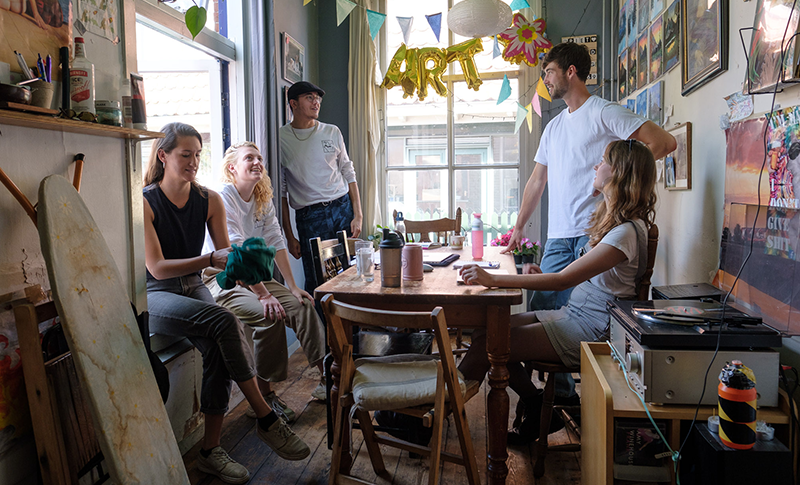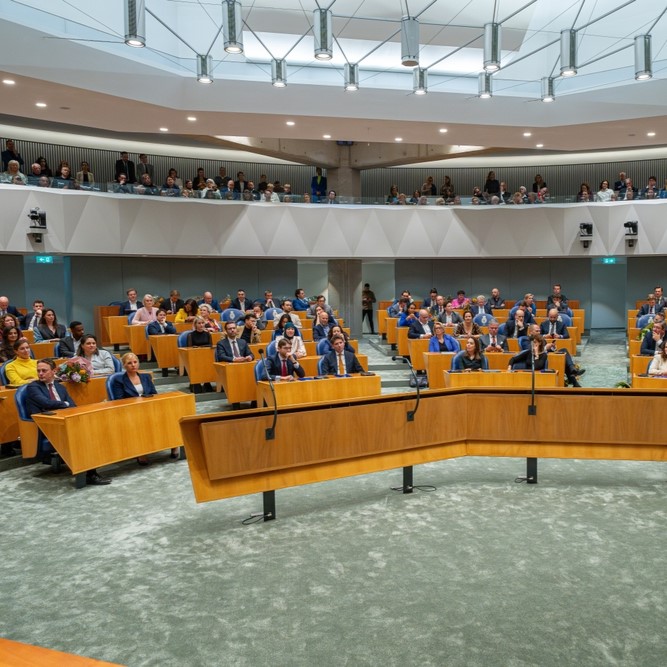The Netherlands needs 60,000 more affordable student housing units by 2030. A national student housing director has been appointed to oversee that process: Ardin Mourik. Resource had coffee with him in Utrecht.
Student housing director, what exactly is that? And why did you get the job?
‘The task is to make things happen and it stems from the 2022-2030 National Student Housing Action Plan. I was appointed by the Ministry of the Interior to ensure that the agreements in that plan are implemented. The main agreement from the action plan is to provide a total of 60,000 affordable student housing units between now and 2030. The student housing sector is very fragmented, and it needs someone who can bring the various strands together. I have a track record as director of Kences (the branch organization for student housing cooperatives, ed.), I’ve worked at the Ministry of Education and I have executive experience as a member of the Provincial Council. In short, I know the worlds of government, education and housing. That’s how they ended up coming to me.’
Is it feasible: 60,000 units by 2030?
‘Yes, but it does call for some creativity. It is not just a matter of newbuilds, but also about redesigning existing buildings. One option is to change buildings with studios into accommodation in which several rooms share facilities.
‘Not all cities have space for newbuilds. In Amsterdam, for example, between 13,000 and 16,000 additional housing units are needed, yet that is where the shortage of space is most acute.
Room-sharing is not a bad idea at all in peak periods
I will make sure municipalities talk to their neighbouring municipalities. There are possibilities in Amstelveen, Diemen and Purmerend, for instance, but they call for good public transport as well. I look at the big picture. I try to help municipalities, but I also tell them: you signed this action plan, now you have to make it happen.’
You advocate more non-self-contained student rooms. Why?
‘It seems that for the past 15 years, all new student accommodation has been studios, with hardly any old-fashioned student houses. Yet you can house more students in smaller spaces in shared houses. Student houses are also much better for wellbeing: there is a lot of loneliness among students. I lived in student houses myself and I thrived on it. It has enormous added value for young people to experience that. It doesn’t have to be 15 people to a house; it can be done on a smaller scale. But please, let’s start building more old-style student houses again.’
Your assignment also includes dealing with peak demand in February and September, when a lot of new students arrive at university and need a room. What are your plans for that?
‘To cater for peak periods, which is especially crucial for international students, we are looking at new options, such as host families, boarding with a landlady and so on. These are most emphatically temporary arrangements: you need to help international students for the first few months to give them time to find a room.’
In Wageningen, rooms are reserved for regular international students and exchange students from outside the EU. They can have the rooms for two years, after which they have been registered as students for long enough to find something else. Should that be the norm?
‘I know the Wageningen student housing provider Idealis well and what they’re doing is impressive. But no one manages it elsewhere in the Netherlands. The other day I even saw an international student on TV who said she flies into the Netherlands every week to attend classes.
Not all cities have space for newbuilds
She sleeps on someone’s couch during the week and then flies home again. That’s crazy of course. It’s one thing for a Dutch student to commute for the first few months, but it’s just not on for international students.’
No rooms are reserved for European exchange students, on the basis that they can get sublets among the larger group of outgoing WUR students. But that was hard for some exchange students last summer and the emergency solution was room sharing. How do you view this?
‘Room-sharing is not a bad idea at all at peak times. In some European countries, nearly everyone shares, two to a room. I’m not saying it should become the norm, but it could be a good temporary solution.’
Should there be special peak arrangements for Dutch students too?
‘It is not feasible to arrange accommodation for all students at peak times. But it may feel unfair to them if rooms reserved for peak times are vacant for a quite a while when they still don’t have a room. It’s easier for Dutch students to commute, although not ideal. The main thing is, we’ve got to build new housing to take that pressure off. With 60,000 housing units, we’ll be well on our way.’
And the private sector?
‘The vast majority of rooms in the private sector are far too expensive, but that market isn’t regulated. The Ministry of the Interior wants to combat exploitation in that market by making regulation mandatory. If that happens, room rates in the private sector will go down by hundreds of euros in many cases, and sometimes by half.’
What is the biggest challenge?
‘Internationalization. What can the Ministry of Education do to manage it? At the moment it’s as though the floodgates are open and we’re sitting back and seeing what happens. But we can’t handle it, not in terms of educational institutions and not in terms of housing. So something must be done at the national level. Should you really be offering all those courses in English? The answer to that question varies from institution to institution and city to city, by the way.’
‘And as well as that: build like crazy.’

 If it were up to Kences, tenants in student houses with shared amenities would recieve a subsidy for their rent, the living allowance. (Photo of student house Het Zaad in Wageningen). Photo Guy Ackermans
If it were up to Kences, tenants in student houses with shared amenities would recieve a subsidy for their rent, the living allowance. (Photo of student house Het Zaad in Wageningen). Photo Guy Ackermans 

